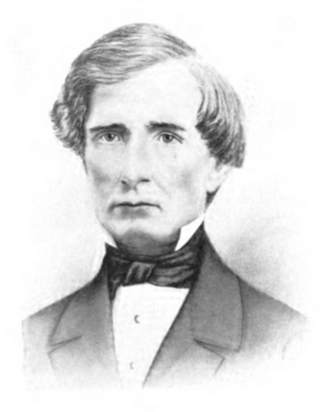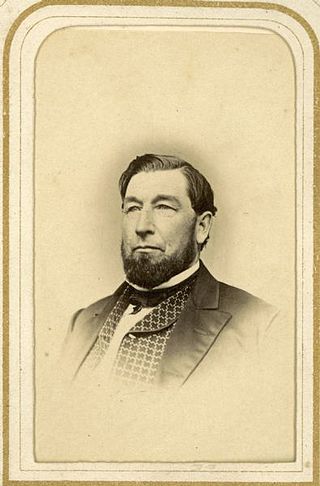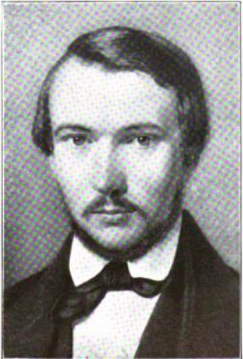Related Research Articles

William Augustus Prentiss was an American merchant,Republican politician,and Wisconsin pioneer. He played an important role in creating the city of Milwaukee,Wisconsin,and was the 10th mayor of that city. He also served in the Vermont House of Representatives,the 2nd Wisconsin Territorial Assembly,and the Wisconsin State Assembly.
Herman L. Page was a merchant and Wisconsin politician. He was born in Oneida County,New York,later moving to Nunda,New York,in Livingston County,New York,in 1844.
The 4th Senate district of Wisconsin is one of 33 districts in the Wisconsin Senate. Located in southeast Wisconsin,the district is entirely contained within northern Milwaukee County. It comprises part of the north side of the city of Milwaukee,as well as the city of Glendale,the village of Shorewood,and parts of northern Wauwatosa and western Brown Deer. The 4th Senate district is one of two majority-black Senate districts in Wisconsin.
Herman G. Tucker was a machinist and politician from Milwaukee,Wisconsin,who served one term as a Socialist member of the Wisconsin State Assembly.

Charles Edward Estabrook was an American educator,lawyer,eugenicist,and Republican politician from the U.S. state of Wisconsin. He was the 14th Attorney General of Wisconsin and served 14 years in the Wisconsin State Assembly,representing first Manitowoc and later Milwaukee. As a young man,he was an enlisted volunteer in the Union Army during the American Civil War. Later,he founded the Wisconsin Historical Commission and published several volumes of history of the Civil War for the Wisconsin Historical Society.
Charles Henry Larkin Sr.,was an American merchant,real estate developer,and Wisconsin pioneer. He was a member of the Wisconsin State Senate (1866–1870) and State Assembly,representing southern Milwaukee County,and was sheriff of Milwaukee County in 1861 and 1862.
Duncan Cameron "Cam" Reed was an American steamship engineer and Democratic politician,and an early settler of Milwaukee,Wisconsin. He served two terms in the Wisconsin State Senate,representing the southern half of Milwaukee County,and was President pro tempore of the Senate for the 1851 and 1853 sessions. He also briefly served as a Union Army officer in the American Civil War.

Josiah Flint Willard was an American dairy farmer,naturalist and businessman living in Janesville,Wisconsin,who served one term as a Free Soiler member of the Wisconsin State Assembly. He was the father of suffragist Frances E. Willard.
Parker Warren was an American farmer from Beaver Dam,Wisconsin who served a one-year term in 1849 as a Free Soil Party member of the Wisconsin State Assembly from Dodge County.

Edward Dwight Holton was an American business leader,politician,and Wisconsin pioneer. He was Milwaukee County's first elected sheriff and served one term in the Wisconsin State Assembly (1860). He was influential in the early political development of the state as a leader in Wisconsin's abolitionist and temperance movements,and as a co-founder of the Republican Party. He also had a strong influence on the economic development of the state through his involvement in the banking,railroad,and insurance businesses.
John Messinger was an American pioneer,politician,teacher,and surveyor who was the first Speaker of the Illinois House of Representatives. Born in Massachusetts,Messinger was educated in Vermont and married the daughter of Matthew Lyon. He left with Lyon to Kentucky,but disagreed with his stance on slavery and came to the Indiana Territory in 1802. He served in the Indiana Territorial Legislature and advocated for the creation of the Illinois Territory. When the state of Illinois was created in 1818,he co-authored its constitution and served in its first General Assembly as Speaker of the House. Messinger was also a prominent surveyor,establishing what is now the state line between Illinois and Wisconsin on behalf of the U.S. government.

Philo Dunning was an American merchant and druggist from Madison,Wisconsin,who held a number of local office,spent a single one-year term as a Reform Party member of the Wisconsin State Assembly from Dane County,and served on the state fisheries commission.
William Wells Brown or W. W. Brown was an American merchant and pioneer settler of Milwaukee,Wisconsin. He was a member of the Wisconsin State Assembly for the 1st Wisconsin Legislature (1848).
Joseph Kerr was an American farmer,Whig politician,and Wisconsin pioneer. He represented Columbia County in the Wisconsin State Assembly during the 1st and 2nd legislatures.
Hollis Latham was a Wisconsin farmer and politician.

Edward Wunderly was an American physician and politician from Milwaukee,Wisconsin.
William Shew was a farmer and businessman from Oak Creek,Wisconsin and Cordova,Illinois who served multiple terms in the Wisconsin Territory House of Representatives representing Milwaukee County,and was Speaker of the House of that body during the first (1847) session of the 5th Wisconsin Territorial Assembly,as well as holding various local government posts.
John Adam Pœrtner,Poertner or Portner was an American mason,miller and politician from Milwaukee,Wisconsin.
Cicero Comstock was an American businessman,Republican politician,and Wisconsin pioneer. He served two years in the Wisconsin State Senate,representing northern Milwaukee County,and was the first city comptroller of Milwaukee.

Samuel L. Rose was an American lawyer,judge,and politician. He was a pioneer settler of Beaver Dam,Wisconsin,and represented that part of the state in the Wisconsin State Senate and State Assembly (1855). He later served as an Iowa circuit court judge and is the namesake of Rose Grove Township,Hamilton County,Iowa.
References
- ↑ "January 23, 1850". Journal of the Assembly of the Third Legislature of the State of Wisconsin. Wisconsin Legislature. 1850. p. 122. Retrieved September 1, 2021.
- ↑ Williams, Edwin. The New York Annual Register, for the Year of Our Lord, 1845 New York: Jansen & Bell, 1845; p. 375
- ↑ Pereles, James Madison. "The Milwaukee School Board: An address on the history of this organization... delivered before the Old Settlers' Club September 2, 1895" in The American School Board Journal, Volumes 10-11; no pagination
- ↑ Buck, James S. Pioneer History of Milwaukee: Vol. 3: Under the Charter, From 1847 to 1853, Inclusive. Milwaukee: Symes, Swain & Co., 1884; p. 61
- ↑ Warner, Hans B., ed. The Blue Book of the State of Wisconsin Madison, 1880; pp. 177, 179
- ↑ "The New Member". Wisconsin State Journal . May 27, 1853. p. 2. Retrieved September 1, 2021– via Newspapers.com.
- ↑ Heg, J. E., ed. (1882). "Annals of the Legislature" (PDF). The Blue Book of the State of Wisconsin (Report). State of Wisconsin. pp. 185–186. Retrieved August 30, 2021.
- ↑ Buck, James S. Pioneer History of Milwaukee: Vol. 4: Under the Charter, From 1854 to 1860, Inclusive. Milwaukee: Swain & Tate, 1886; pp. 164-165
- ↑ Powers, D. J.; Skinner, E. W. (eds.) The Wisconsin Farmer, and Northwestern Cultivator; a monthly journal, devoted to agriculture, horticulture, mechanics and rural economy April 1856 (Volume VIII, No. 4); p. 150
- ↑ Wisconsin State Agricultural Society. Transactions of the Wisconsin State Agricultural Society, with portions of the correspondence of the secretary Vol. II. Madison: Beriah Brown, State Printer, 1852; pp. 68, 82
- ↑ "Horticultural" and "Messinger, R. N." in Milwaukee City Directory for 1857 & 1858 Volume 1 First Series; Milwaukee: Steam Press of King, Jermain & Co., 1858